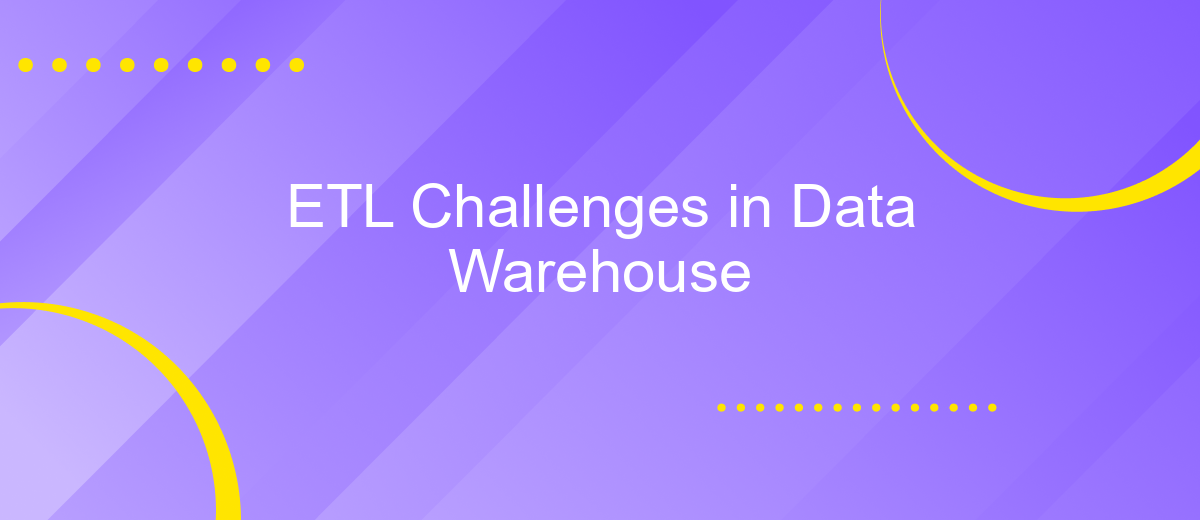ETL Challenges in Data Warehouse
Extract, Transform, Load (ETL) processes are the backbone of data warehousing, enabling the seamless integration and transformation of data from multiple sources. However, these processes come with their own set of challenges. From data quality issues to performance bottlenecks, understanding and addressing these challenges is crucial for maintaining an efficient and reliable data warehouse. This article explores the common ETL challenges and offers strategies to overcome them.
ETL Challenges in Data Warehouse
ETL (Extract, Transform, Load) processes are crucial for maintaining an efficient data warehouse, but they come with several challenges. These challenges can significantly impact the performance, accuracy, and reliability of data integration.
- Data Quality: Ensuring the accuracy and consistency of data during extraction and transformation is critical.
- Scalability: Handling large volumes of data efficiently as the organization grows can be difficult.
- Real-time Processing: Meeting the demand for real-time data integration and processing requires robust infrastructure.
- Complexity: Managing and maintaining complex ETL workflows can be resource-intensive.
- Integration: Seamlessly integrating various data sources often requires specialized tools and services.
To address these challenges, leveraging integration platforms like ApiX-Drive can be beneficial. ApiX-Drive simplifies the process of connecting diverse data sources, automating workflows, and ensuring data consistency. By using such tools, organizations can enhance their ETL processes, making their data warehouses more reliable and efficient.
Data Extraction Challenges

Data extraction is a critical phase in the ETL process, but it comes with its own set of challenges. One of the primary issues is dealing with diverse data sources. Organizations often need to extract data from multiple systems, such as databases, cloud storage, and third-party applications. Each of these sources may have different data formats, protocols, and access methods, making the extraction process complex and time-consuming. Additionally, ensuring the accuracy and completeness of the extracted data is crucial, as any errors or missing data can lead to flawed analyses and decision-making.
Another significant challenge is the performance and scalability of the data extraction process. As the volume of data grows, traditional extraction methods may become inefficient and slow, leading to delays in the overall ETL pipeline. This is where automated integration services like ApiX-Drive can be highly beneficial. ApiX-Drive simplifies the integration process by providing a user-friendly platform to connect various data sources seamlessly. It supports a wide range of applications and databases, enabling organizations to automate data extraction tasks and ensure timely and accurate data availability for downstream processes.
Data Transformation Challenges

Data transformation is a critical phase in the ETL process, where raw data is converted into a format suitable for analysis. However, it presents several challenges that can hinder the efficiency and accuracy of data processing.
- Data Quality Issues: Inconsistent, incomplete, or duplicate data can lead to inaccurate transformations and unreliable insights.
- Scalability: As data volume grows, transformation processes need to scale efficiently to handle increased loads without compromising performance.
- Complex Transformations: Advanced calculations, data aggregations, and format conversions require sophisticated logic and can be error-prone.
- Integration with Multiple Sources: Combining data from various sources with different formats and structures can be challenging and time-consuming.
- Real-Time Processing: Ensuring real-time data transformation for up-to-date insights demands robust and efficient processing capabilities.
To address these challenges, leveraging integration services like ApiX-Drive can be beneficial. ApiX-Drive offers automated data integration solutions, simplifying the transformation process by connecting diverse data sources seamlessly. This not only enhances data quality but also ensures scalability and real-time processing, making data transformation more efficient and reliable.
Data Loading Challenges

Data loading in a data warehouse environment presents numerous challenges, significantly impacting the efficiency and accuracy of data processing. One of the primary issues is the volume of data, which can be overwhelming, leading to longer load times and increased chances of errors. Additionally, ensuring data quality during the loading process is critical but often difficult, as data may come from various sources with different formats and standards.
Another significant challenge is managing the dependencies and synchronization between different data sources. Timely and accurate data integration is crucial for maintaining the integrity of the data warehouse. Tools like ApiX-Drive can help streamline this process by automating the integration and synchronization of data from multiple sources, ensuring that the data is consistent and up-to-date.
- Handling large volumes of data efficiently
- Ensuring data quality and consistency
- Managing dependencies and synchronization between sources
- Automating data integration and loading processes
Addressing these challenges requires a combination of robust tools and best practices. Leveraging services like ApiX-Drive can significantly alleviate some of the burdens associated with data loading, enabling smoother and more reliable data integration for your data warehouse.
- Automate the work of an online store or landing
- Empower through integration
- Don't spend money on programmers and integrators
- Save time by automating routine tasks
Conclusion
In conclusion, addressing ETL challenges in data warehousing requires a comprehensive approach that includes careful planning, robust tools, and continuous monitoring. Organizations must prioritize data quality, scalability, and performance to ensure seamless data integration and transformation processes. By adopting best practices and leveraging advanced ETL tools, businesses can overcome common obstacles such as data inconsistency, latency, and integration complexity.
Furthermore, utilizing integration services like ApiX-Drive can streamline the ETL process by automating data workflows and reducing manual intervention. ApiX-Drive offers a user-friendly platform that simplifies the connection between various data sources and destinations, ensuring efficient and reliable data transfers. By incorporating such solutions, organizations can enhance their data warehousing capabilities, ultimately enabling better decision-making and driving business growth.
FAQ
What are the common challenges faced during the ETL process in data warehousing?
How can data quality issues be addressed during the ETL process?
What strategies can be used to handle large volumes of data in ETL processes?
How can one ensure data consistency and integrity during ETL?
What tools or services can be used for automating and integrating ETL processes?
Routine tasks take a lot of time from employees? Do they burn out, do not have enough working day for the main duties and important things? Do you understand that the only way out of this situation in modern realities is automation? Try Apix-Drive for free and make sure that the online connector in 5 minutes of setting up integration will remove a significant part of the routine from your life and free up time for you and your employees.


